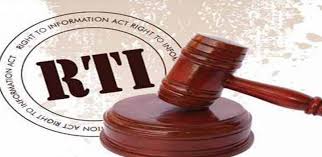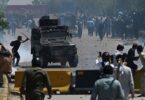Shukria Ismail
‘‘Information belongs to the people and must be returned to them, the government is only custodian of this information, or in other words we can say; whoever is using public money is answerable to public for the duties they perform and decisions they take.’’
Right to Information, as the name suggests, this is the right of citizens to know what’s happening around them and who’s doing what. People have the right to question about everything where the public money is involved and the important decisions regarding fate of the people take place. Under RTI, citizens can demand information and the government is obliged to share that.
“Right to Information” is not just the combination of three words making an ordinary statement, indeed “Right to Information” is a Law, having its proper position in the different constitutions of different countries, all around the globe. It has different names in the countries having it, as one of their laws in their constitutions. It is called as “Freedom of information law” in the United States of America, Australia, united kingdom and Norway etc.” Access to Information or Documents law” in Canada, Columbia and Denmark. “Right to information law” is a rather more recent name it acquired after the law was passed by India in 2005, and the same name for it in our country “Islamic Republic of Pakistan”. However, functions the same, that’s: people’s ability to access information.
In Pakistan, we have 5 Acts regarding “Right to Information” in practice_ four in Provinces and one at federal level. They are more or less similar yet they’re separate and applicable in different jurisdictions. We will not skip mentioning the names of all, they are; Federal Right of Access to Information Act 2017, Khyber Pakhtunkhwa Right to Information Act 2013, Punjab Transparency and Right to Information Act 2013, Sindh Transparency and Right to Information Act 2016, and Balochistan Right to Information Act 2021.
As belonging to Khyber Pakhtunkhwa province, we will emphasize more on our Right to Information, that’s: “Khyber Pakhtunkhwa Right to Information Act 2013”, giving the reference of Article 19-A of constitution of Pakistan, Which states that: “Every citizen shall have the right to have access to Information in all matters of public importance subject to regulation and reasonable restrictions imposed by the law”
It means that people of Khyber Pakhtunkhwa and merged districts can demand for information, can ask question regarding what’s going on around them and who’s doing what, in the Khyber Pakhtunkhwa government institutions and authorities. People can make them accountable because these government institutions and authorities are bound by the article 19-A of the Constitution of Pakistan to share that information and answer the questions of the people.
But there are certain limitations regarding the information people ask for. people can ask confidently for that information Which is very closely related to them , that’s: they can question that where there money get spend by their Khyber Pakhtunkhwa government and its institutions, such as budget allocation for health, safety, education, clean drinking water, clear roads and streets, these are some examples of limitations for the people which they should keep in mind while asking for information. There is prohibition on asking for information related to national security, international affairs and other major information like these two, because information like this ,is not related to people or is not their cup of tea.The rest they can ask anything related to them if they have any issue, confusion, suspection, either it is personal or related to the performance of the government.
The purpose and advantage of Khyber Pakhtunkhwa Right to Information Act 2013 is that first of all it is empowering the people of Khyber Pakhtunkhwa and merged districts by enabling them to ask for their rights and make their Government accountable. Secondly, it is Anti-corruption Tool, Which can best fight with corruption and can expose the wrong doings and corrupt practices. Thirdly, this legislation is democratizing the information and not letting the important information related the life and fate of the people just in the hands of members of provincial assembly and government officers. fourthly, it is making the government accountable to the people, in order to bring Transparency in the Political system of Khyber Pakhtunkhwa Province.
Further, Khyber Pakhtunkhwa Right to Information Act 2013 guarantee the dignity of the people. It is even very crucial and helpful for the journalists and activists of Khyber Pakhtunkhwa who are always curious to get authentic and accurate information without any barrier.
Point to note necessarily that every citizen of Khyber Pakhtunkhwa, either educated or not, working or not, is eligible to apply for information under Khyber Pakhtunkhwa Right to Information Act 2013.Now here the main question prompts Which is that; where and how to make an information request?, so the citizen/requester of Khyber Pakhtunkhwa can make a request for information in writing, to the designated official of the public body, using the application form available both in English and Urdu language, on the official website of Khyber the Pakhtunkhwa Right to Information commission and send it through email to the designated official. However, the requester can also make request on a plain paper by describing the requested information on it and providing his/her contact details, and can send it through postal address or can handed over to the designated official.Even if one can’t write ,he/she can verbally ask for information.
The asked question or requested information will be addressed within 10 to 20 working days under the KP-RTI. keep in mind that Khyber Pakhtunkhwa Right to Information Act 2013 also contains punishment incase of misuse of the requested information.
Some reputable organizations are providing awareness sessions on Khyber Pakhtunkhwa Right to Information Act 2013, which is amazingly an appreciable step of them.one these organizations are “Centre for governance and public accountability” in short can call it as CGPA, is playing its role very actively by awarding the people of Khyber Pakhtunkhwa about their rights to access to information. CGPA is training the youth from different backgrounds and professionals from different field on RTI laws for so many years.







